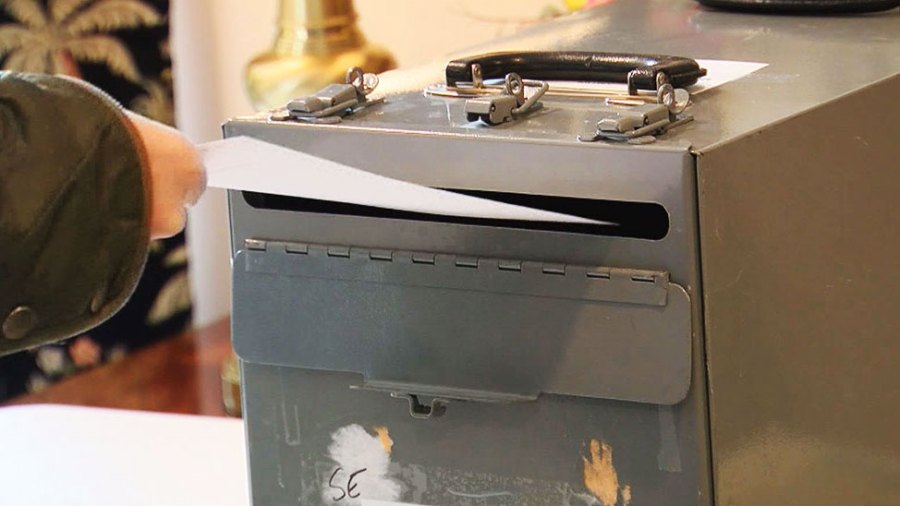NOTE: This is the second of seven stories previewing the seven different ballot questions South Dakota voters will weigh in on in the 2024 General Election. Absentee voting starts Sept. 20, the voter registration deadline is Oct. 21 and Election Day is Nov. 5.
PIERRE, S.D. (KELO) — Two years ago, South Dakota voters decided to increase the maximum amount of income that a person can make and still be eligible to receive Medicaid healthcare services. Now, voters are being asked a second question, on the same issue, this election that would let state government tighten up some of that expanded eligibility.
Amendment F on the November statewide ballot would, if passed, further amend the South Dakota Constitution, so that South Dakota state government could place work requirements on many of the enrolled adults, if those enrollees want to continue getting Medicaid benefits under the expanded eligibility.
What does a “Yes” vote mean, what does a “No” vote mean?
A “Yes” vote on Amendment F would adopt changing the South Dakota Constitution for work requirements for Medicaid expansion candidates.
A “No” vote on Amendment F would leave the South Dakota Constitution as it is.
How Amendment F got on the ballot?
The Legislature’s Republican super-majorities put Amendment F’s work requirement on the 2024 ballot. They waved aside objections from Democratic lawmakers, as well as many of the groups that had banded together to campaign for Medicaid-eligibility expansion.
Voters in 2022 approved putting the eligibility expansion into the South Dakota Constitution by a solid margin statewide, with 192,057 voting yes versus 149,616 who marked no. That came amid a major advertising campaign from the vote-yes coalition.
The goal was to allow government-funded health services to be available to people whose household income was 138% of the federal poverty level. In South Dakota, the maximum gross monthly amounts are $1,732 for a one-person household; $2,351 for two persons; $2,970 for three; and correspondingly higher amounts as the household size increases.
In actual wages, for a one-person household, that’s a job paying at most $9.99 per hour for a 2,080-hour work year. The statewide minimum wage is $11.20 per hour in 2024.
Nonetheless, the 2022 results saw more no than yes votes in 29 of the state’s 66 counties. In the 2024 legislative session, Republican Senate leader Casey Crabtree sponsored the work-requirement proposal in his chamber, while Republican Rep. Tony Venhuizen led the way in the House.
The 2022 change put expanded Medicaid eligibility into the state constitution, including a paragraph that states, “The State of South Dakota may not impose greater or additional burdens or restrictions on eligibility or enrollment standards, methodologies, or practices on any person eligible under this section than on any person otherwise eligible for Medicaid under South Dakota law.”
Republican lawmakers now want to add a qualifier to that paragraph that says, “except that the State of South Dakota may, to the extent permitted by the United States Department of Health and Human Services, Centers for Medicare and Medicaid Services, impose a work requirement on any person, eligible under this section, who has not been diagnosed as being physically or mentally disabled.”

KELOLAND News election resources
Groups that testified in support of letting voters decide the work proposal included National Federation of Independent Business, South Dakota Retailers Association, Associated General Contractors of South Dakota, and South Dakota Farm Bureau.
Groups that testified against putting the work proposal on the ballot included Avera Health, AARP South Dakota, American Cancer Society Cancer Action Network, South Dakota Farmers Union, Presentation Sisters, Leukemia and Lymphoma Society, South Dakota Nurses Association, and South Dakota Advocacy Network for Women.
Republican lawmakers soft-pedaled the issue, saying the change would simply let state government have the choice of whether to ask the federal government for permission. Currently, with Democratic President Joe Biden in the White House, no state is allowed have a work requirement for Medicaid expansion.
South Dakota voters are now being asked whether they want to add the work requirement. A yes vote would further amend the South Dakota Constitution and let the state government ask the federal government to impose a work requirement for most people making between 100% and 138% of the federal poverty level, haven’t been diagnosed as being physically or mentally disabled, and receive Medicaid benefits under the expanded income eligibility. A no vote is against putting that option in the constitution.
Republican Senate leader Casey Crabtree and Republican Rep. Tony Venhuizen were the prime sponsors of Senate Joint Resolution 501. Supporters and opponents lined up at the Senate and House committee hearings to testify about putting it on the 2024 ballot. The Senate voted 28-4 along Republican-Democrat lines to send it to the House for consideration. There, House members voted 63-7, again along party lines.
Republican Governor Kristi Noem signaled her administration’s support for the work requirement, when Social Services Secretary Matt Althoff testified in support of the proposal. The Department of Social Services administers South Dakota’s Medicaid program.
The previous administration of Republican Governor Dennis Daugaard looked at expanding Medicaid eligibility, but the Republican-dominated Legislature’s leaders showed no support. The Daugaard administration also sought a work requirement for Medicaid recipients, but that application wasn’t granted.
To date, 40 states including South Dakota have adopted Medicaid expansion, while 10 states have not.

